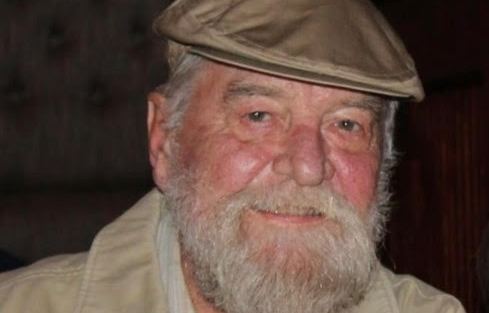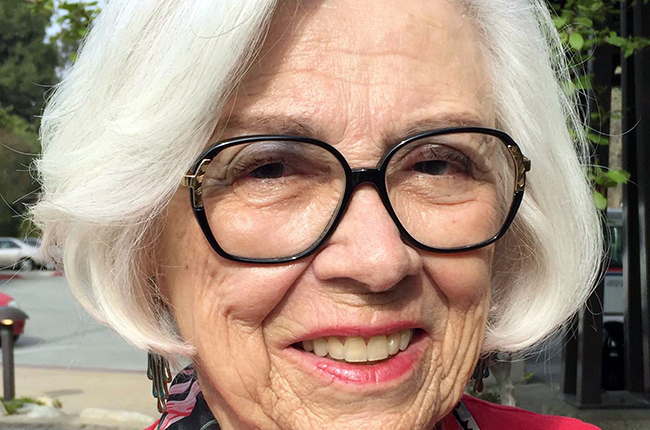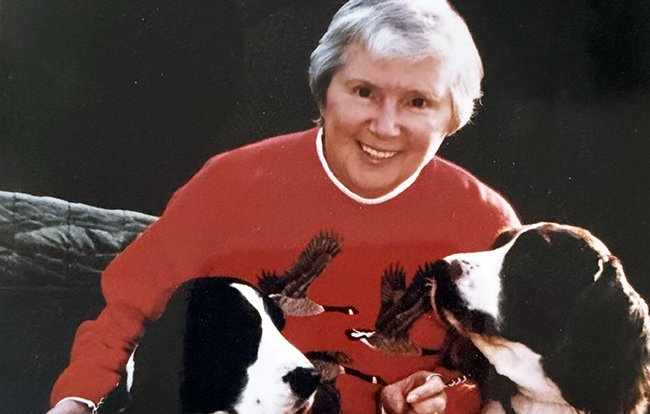Jim “Citizen” Sprinkle
TV repairman, COURIER distributor, prize storyteller
Jim Sprinkle, a longtime COURIER distributor, died on Friday, August 24 in Montclair. He was 92.
Mr. Sprinkle was born on October 19, 1920 in Seeley, California, the 9th child in a large family. His mother died after giving birth and, because he was premature, the doctor predicted he would join her within a week.
“That doctor is dead now,” he used to observe with a chuckle.
Mr. Sprinkle was taken in by an aunt and raised with her 2 children, who became like sisters to him. They lived in Indio, on what he characterized as “a dirt farm,” before moving in 1931 to Claremont, where they lived across the street from the Blaisdell family. He often recounted what the city was like back then in hours-long bull sessions with COURIER distributor Tom Smith.
When frost came, Mr. Sprinkle said people would do anything to keep their citrus trees warm, even burning tires. “It was so smoky, you couldn’t even see your hand in front of your face.”
Mr. Sprinkle attended Sycamore Elementary during the Great Depression, when many children came to school in threadbare clothing and without shoes. He recalled that Eleanor Condit used to make clothes for needy students. He matriculated to Claremont High School and was in 11th grade at the time of the 1938 flood that inundated the Claremont area.
Mr. Sprinkle occasionally provided a rare first-person account of the historic calamity. Mt. Baldy was covered in snow, he related, when the “banana rain” hit—“tropical rains that come from down south.” Within 20 minutes, the snow had all melted, and that’s when the torrent hit. Mr. Sprinkle, who was helping to sandbag Pomona College to save the student union, rescued someone who was being battered by floodwaters.
“That big wash was so heavy, it pulled off their trousers,” he said.
In the aftermath, Claremont’s downtown was filled with 3 feet of silt. Except for one woman who was swept away during the flooding, life went on. Mr. Sprinkle, an accomplished track athlete, set a league record in 1939 for the high jump, 6 and ½ feet, at a CIF divisional meet.
He also had interests ranging beyond sports. After he heard his first radio broadcast in 1927, he was hooked. “It enthralled me,” he shared in a Senior Spotlight profile, published in the 2007 edition of the COURIER’s Almanac. “I used to make crystal sets, and one- and 3-tube radios when I was a kid.”
Mr. Sprinkle loved to listen to Big Band music or tune into the word via a short-wave radio. It made his world seem larger in a time when Claremont didn’t even have a movie theater.
“You’d have to go to Riverside to see a film,” he told Mr. Smith. “There was nothing to do but get a bottle of alcohol and a girl and park in the citrus field.”
When Mr. Sprinkle was a teen, Claremont High School students were ushered into the auditorium to listen to Adolph Hitler’s radio broadcasts. A few years later, many of the boys in the audience would find themselves fighting Hitler’s armies.
Mr. Sprinkle attended Chaffey College after high school. After Pearl Harbor was bombed, he joined the Army Signal Core in 1942, where he reached the rank of Master Sergeant. He repaired broken communications equipment at a B-17 training base in Spokane, Washington and then became a member of the first American forces to journey overseas. He served in England and Europe before landing in Algeria to confront French occupiers and, later, to resist a German portion of the Afrika Korps.
His army experiences were defining moments for Mr. Sprinkle. He enjoyed sharing the photos he snapped during World War II—of sights like the Leaning Tower of Pisa or historic happenings like President Eisenhower and General MacArthur signing a treaty.
Mr. Sprinkle had a rich repertoire of wartime anecdotes, including one COURIER publisher Martin Weinberger shared in a 2005 column:
“One warm night in the desert of North Africa—only God knows exactly where—Jim became very sleepy. He climbed aboard a tank that appeared to be resting easily and soon fell asleep.
“About 2 a.m., Jim was awakened as the tank began to rumble and roar. He knocked on the tank’s turret and the crew chief appeared. Jim asked what was going on, since tanks don’t always rumble in the middle of the night. ‘I don’t know about you, buddy,’ the chief declared, ‘but I’m going to shoot Germans.’
Needless to say, he was quick to jump off the tank. After being discharged from the army in 1945, Mr. Sprinkle kept his discharge papers in his wallet throughout his life, often saying, “I figure if I drop dead, they’ll know who I am because I have my discharge papers on me.”
After the war, Mr. Sprinkle met Florence May Meyers and the couple married in 1952. In 1961, he returned to Claremont with his wife, where he became part owner of the Teletronics TV and Repair Shop on Yale Avenue. When Teletronics went out of business, Mr. Sprinkle went to work for Claremont TV, which was located on the corner of 4th Street and Indian Hill Boulevard. Driving through Claremont, he used to boast that he had installed aerials on all the roofs in town.
Mr. Sprinkle’s first wife died in 1968, and he married Mary Opperman in 1969. After his second wife died in 1975, “I got out of the wife business,” he’d say with finality.
After repairing televisions in Claremont for 40 years, Mr. Sprinkle retired from Claremont TV in 1988. In 1989, when Mr. Sprinkle was 69 years old, Martin Weinberger offered him a job taking the newspaper to the press to be printed, and delivering the newly-printed copies to newspaper vending machines around town.
Mr. Sprinkle quickly endeared himself at the COURIER, greeting staffers with a friendly “How do,” and leaving them with an, “I’ll see you millionaires later.”
“He was so strong,” Mr. Smith said. “We used to deliver the magazine—really big jobs—and he would always huff and puff. But that was because it was hard.”
Mr. Smith says Mr. Sprinkle’s fortitude still serves as an inspiration.
“Whenever I’m having a day where I’m thinking, ‘This is hard,’ I realize, I can’t complain. That guy did it and he was already in his 70s.”
In 1992, Mr. Sprinkle, then 71, had a massive heart attack while walking into the COURIER one afternoon. He had to be revived 4 times on the way to the hospital, so he considered this crisis as the second time he cheated death. He often referred to it as his second birthday.
After performing an angioplasty, his doctor told Mr. Sprinkle to slow down, stop smoking and quit drinking. “The doctor said every night isn’t Saturday night anymore,” he quipped in his Almanac profile. For the rest of his nearly 20-year employment with the COURIER, Mr. Sprinkle confined his deliveries to local elementary schools and 2 Claremont retirement communities, an assignment still called “Jim’s Route.”
He heeded his doctor’s orders, quitting smoking and only sipping the occasional near-beer, all the while railing about its inferior taste. He never completely beat his renowned sweet tooth. Each year, he looked forward to a “birthday cake” provided by COURIER office manager Vickie Rosenberg, who always took pains to buy him his favorite dessert: an apple pie.
For many people, slowing down includes more time in front of the TV. Mr. Sprinkle, to the contrary, was proud of the fact that he never watched TV, a pursuit he felt made people lazy. He said he’d spent the better part of his life looking at the backside of a TV, and preferred to listen to the radio. Just like when he was a boy, he loved listening to ball games and Big Band music, and fiddling with his short-wave radio.
While he feigned cantankerousness, Mr. Sprinkle was also generous, helping many friends over the years by giving them a place to live while they got their lives on track.
Even as he got older and faced health problems, Mr. Sprinkle kept his wit. When asked how he was doing, he’d answer, “Well, I woke up.”
Up until the end, Mr. Sprinkle loved to shoot the breeze more than anything, hearkening back to his COURIER days when, as Mr. Smith described, “If you were in the mood to talk, it was endless information. He loved that you wanted to hear it.”
While Mr. Sprinkle is no longer running his route, his memory remains firm with numerous COURIER staffers and alums as well as those who served him at his favorite haunt, The Village Grille.
“I don’t believe in no happy hunting grounds,” he used to say, but Ms. Rosenberg says she likes to imagine him in a better place.
“He was just a wonderful character who was full of stories: stories of the history of Claremont, stories about the families here—stories about everything.”
—Sarah Torribio
storribio@claremont-courier.com










0 Comments